
Annual Report SWI swissinfo.ch 2021

Dear readers – friends of SWI swissinfo.ch, the Swiss abroad, and people interested in Switzerland,
For decades now, SWI swissinfo.ch has been reporting the news as a digital platform of Switzerland’s public broadcaster, placing Swiss current affairs and decisions in an international context.
We do this for everyone abroad who is interested in the role Switzerland plays in the world. Journalistically independent and unique and featuring multiple viewpoints, SWI offers background and expertise on current global debates.
We have chosen to look back on the year 2021 through the lens of eight topics that struck a chord with our users and sparked conversations. We believe that these themes will continue to engage our attention in the next 12 months. We’ll come back to them in the second part of this report.
But first, we want to look at another important issue that SWI swissinfo.ch took on in 2021: initiatives against disinformation and “fake news” that necessitate close cooperation between journalists at an international level. SWI swissinfo.ch strengthened its partnership with other public broadcasters in Europe over the course of the year.
Part 1: Strengthened partnerships with European public media
As an international public service organisation, the European Broadcasting UnionExternal link in Geneva is a vital partner for SWI swissinfo.ch. In 2021 we were able to intensify cooperation with other public broadcasters on the continent thanks to a new EBU project, A European Perspective. By using a common technical system featuring automated translation, we’ve gained access to stories and videos from our European partners and can share our own content with them. This exchange allows us to reach more people and offer them perspectives from Switzerland. Such cooperation and mutual distribution of content have helped to increase SWI’s reach and visibility in Europe. They also enable greater cooperation between European journalists and allow public broadcasters to build a counterpoint to disinformation. The first test phase of the project was completed at the end of February 2022.
More and more, “fake news” are competing against reliable and trustworthy sources in general and public broadcasters in particular. To help people as well as search engines quickly identify which is which, in 2019 Reporters Without BordersExternal link launched the Journalism Trust Initiative for journalistic standards. This quality label was awardedExternal link to SWI swissinfo.ch in August 2021 after a three-step process. Now used by several media outlets, the label has the potential to be an efficient and effective tool against disinformation and to create more space and visibility for quality journalism around the world.
In the last quarter of 2021, SWI swissinfo.ch was also admitted to the DG8External link thanks to the initiative of Gilles Marchand, the director-general of the Swiss Broadcasting Corporation. This international media network supports journalistic independence, fights disinformation, campaigns for worldwide access to information and the safety of media workers, and launches development projects in digitalisation. Being part of this group allows us to strengthen cooperation and boost Switzerland’s international profile.
Finally, in 2021 we introduced a multilingual discussion forum on our platform, an initiative with great potential going forward. Readers all over the world can participate in SWI swissinfo.ch debates in any of the ten languages we offer. Contributions from our users can be translated automatically into another language of their choice, thereby bringing our international audience closer together on common points of interest.
Part 2: Swiss themes that will also move the world in 2022
Some of the topics we have chosen to present in this report have received attention far beyond this country’s borders. SWI swissinfo.ch has followed these issues from the outset, despite them having had a more global resonance only more recently.
Switzerland and Covid-19
By international comparison the number of cases of Covid-19 in Switzerland rose steeply on several occasions over the course of the pandemic, bringing unprecedented attention to this small country. One of the most hotly debated questions is whether hospitalisations – and pressure on intensive care units – will increase dramatically, and whether that will mean drastic measures might once again be necessary.
SWI swissinfo.ch’s reporting on the pandemic went beyond our mandateExternal link and attracted a relatively high number of readers within Switzerland. Our coverage seemingly filled an information gap, especially for speakers of non-native languages resident in the country.
Four SWI articles gained an above-average response from international readers:

More
Fate of Covid certificate to be decided at the ballot box

More
While Switzerland struggles to vaccinate, Portugal is already finished

More
Covid protest draws thousands to Swiss capital

More
Swiss scientists discover coronavirus’s ‘Achilles heel’
Based on our experience over the last two years, we anticipate that the following Swiss aspects of the pandemic will grab other countries’ attention in 2022:
👉 decisions concerning the response to the pandemic taken by the people through direct democracy;
👉 research findings from institutions like universities and from the private sector (e.g., pharmaceutical industry);
👉 any deviation in Switzerland from global pandemic trends.
Switzerland and archaeology
International scholars are often astounded when discoveries of objects from the Middle Ages or earlier are made in Switzerland. These events created a sensation in 2021:
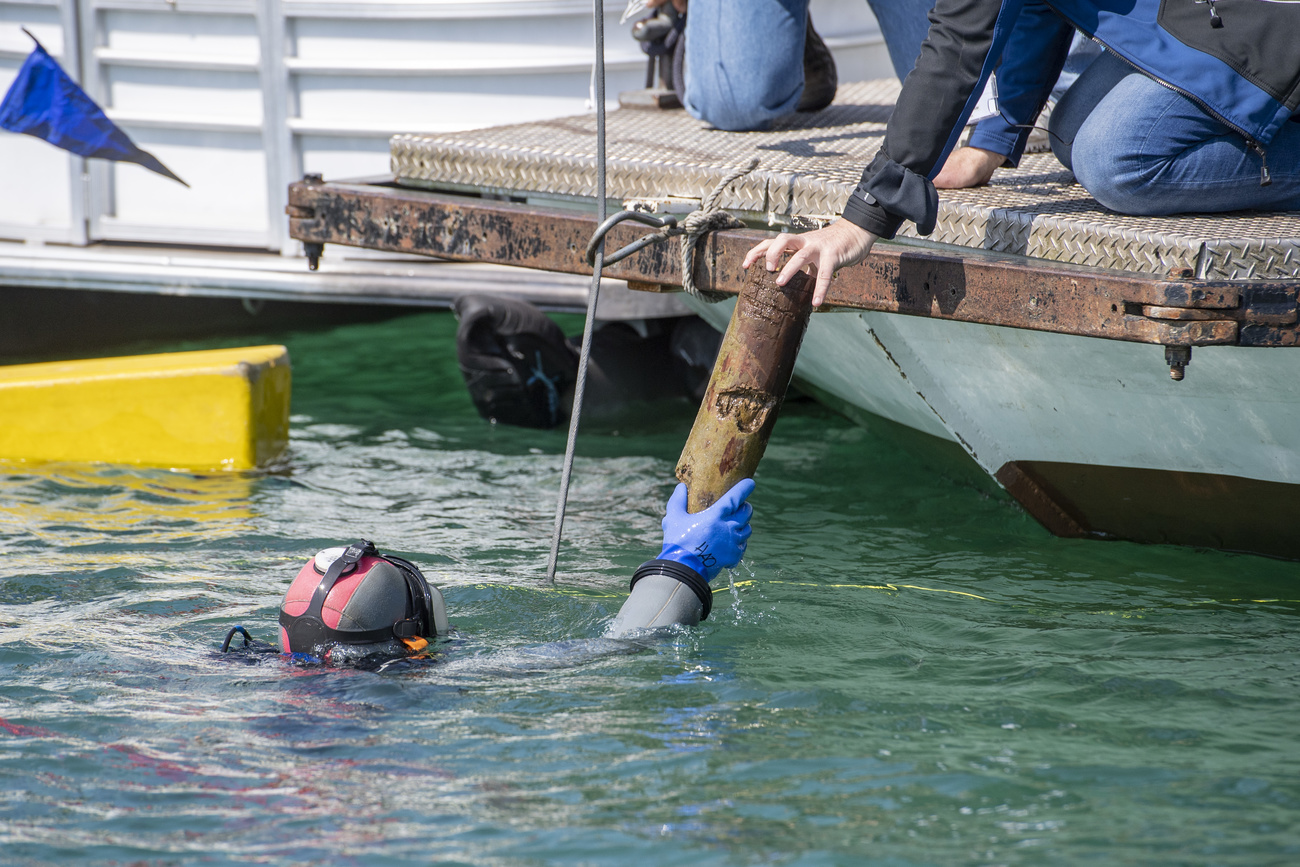
More
Bronze Age village found under Swiss lake

More
How a hobby archaeologist uncovered a Roman battle site
It is impossible to predict if or when and where in Switzerland new finds or even whole settlements might come to light in 2022. The discoveries of the past year, however, suggest that Switzerland will make international news headlines again with
👉 further items being found at existing archaelogical sites;
👉 advances in technologies that help experts to make new discoveries.
Switzerland and the Zurich fine arts museum
Some debates out of Switzerland have taken on a more intense tone than others. One was around the Bührle art collection, which opened last summer at the Zurich museum of fine arts and became a talking point beyond our borders in the months that followed. As things progressed, it grew into a complex discussion about how “looted art” should be handled today. We contributed to this debate with comprehensive coverage of the issues surrounding the Bührle collection. We also published a background piece on the curatorial future of the museum and its extension designed by star architect David Chipperfield:

More
New Kunsthaus Zurich poised to reclaim global limelight

More
Zurich art museum succumbs to Bührle’s ambitions
Just before the new year, the German newspaper Frankfurter Allgemeine Zeitung published an article suggesting that the museum in Zurich would continue to make news headlines in 2022 for its handling of the Bührle collection.
Switzerland and assisted suicide
Foreign media outlets often report on the attitude of the Swiss to assisted suicide. They portray the subject in a variety of ways – be it liberal or cynical – depending on their cultural viewpoint.
Discussions on assisted suicide tend to strike a chord among many users, especially Japanese speakers. Kaoru Uda covers this topic at SWI swissinfo.ch and her January 2021 article racked up 20,000 hours of readership around the world.
The debate is far from over:
👉 read the following article about a man from Japan who travelled to Switzerland to die. We accompany him on his last journey.

More
Yoshi travels from Japan to Switzerland to die
Switzerland and climate change
Alternating with waves of the coronavirus pandemic, the climate crisis will come back into focus in 2022. From an international perspective, Switzerland’s role will be observed on three fronts:
👉 climate change in the Alps;
👉 positions and decisions at the political level;
👉 significant findings from Swiss researchers.
In relation to the first point, SWI swissinfo.ch published an article last year by our climate specialist Luigi Jorio that was citedExternal link among the sources for a study by a think-tank in India.

More
Loss of permafrost – a global cause for concern
Switzerland as a centre for climate research will continue to gain attention in 2022, thanks in part to scientists like Sonia Seneviratne.
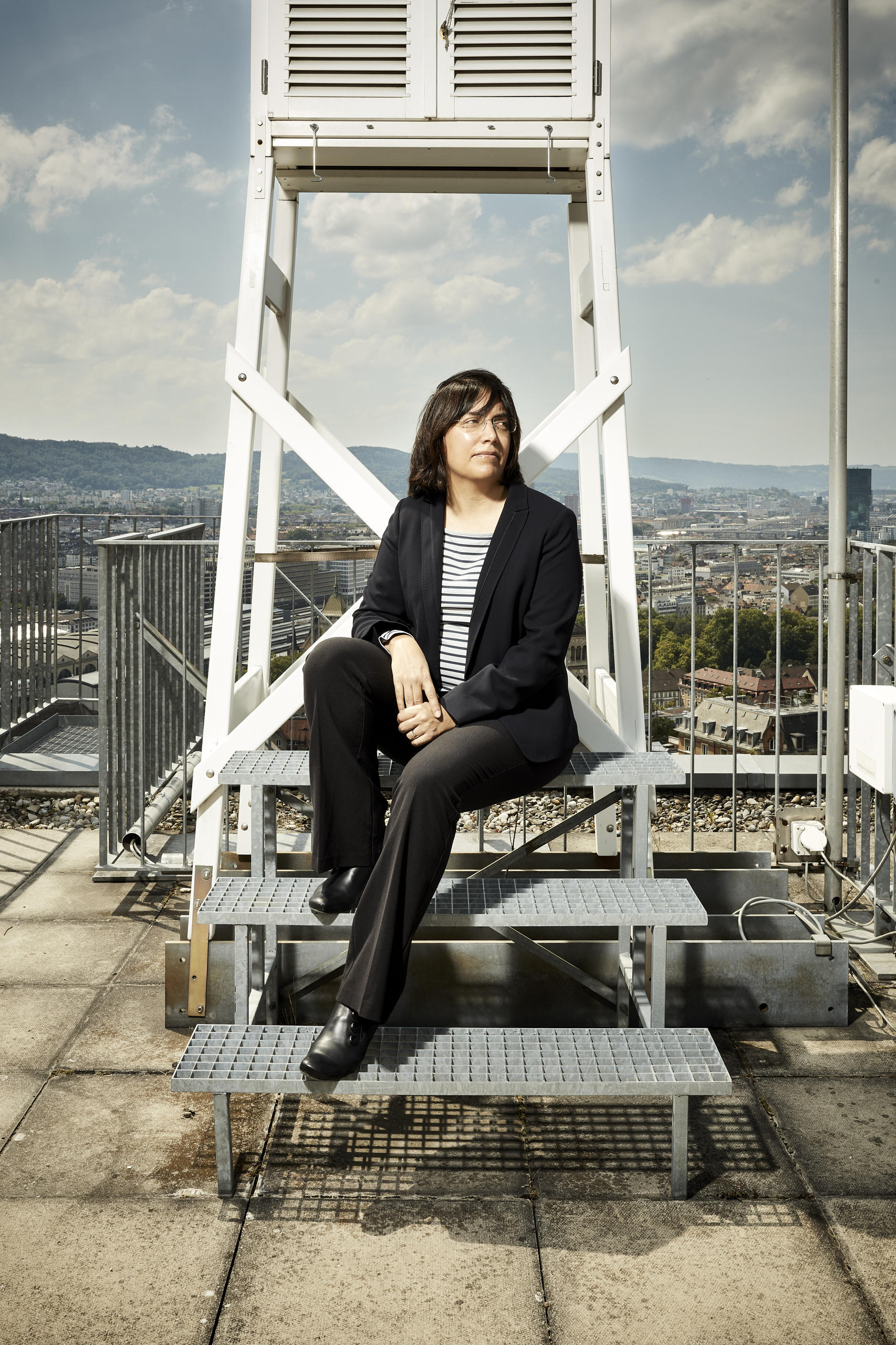
More
‘We are at the start of a new climate regime’
Switzerland and International Geneva
There are no indications currently that a summit comparable to the one between Joe Biden and Vladimir Putin will take place in Geneva in 2022. Their meeting was an opportunity for us to highlight the importance of our focus on International Geneva.
Often, however, the less high-profile events and constant activity in Geneva are more interesting to cover. These organisations and events will continue to be a focal point of our reporting:
👉 WHO, due to the pandemic and implementation of institutional reforms;
👉 the ICRC will have a woman – Mirjana Spoljaric Egger – as its president for the first time in its history, beginning September 2022;
👉 the UN Human Rights Council (notably Ethiopia and visits to suspected forced labour camps in China).
Switzerland and crypto technologies
Last year two SWI articles on financial technology (fintech) in particular attracted an international readership:

More
Swiss ‘Crypto Nation’ supports African blockchain ambitions

More
Swiss Post to launch Switzerland’s first crypto stamp
It is not a coincidence that we sometimes publish these articles in English only. English is the language of our fintech specialist, Matthew Allen. But most international debates on crypto technologies and fintech also happen to take place in English.
In 2022, Switzerland will be in the international spotlight for these topics:
👉 as Swiss Post successfully launched its first “crypto stamp” in 2021, other Swiss corporations are likely to want to jump on the NFT bandwagon in 2022;
👉 since the SIX Digital Exchange received the green light from regulators in 2021, it will spearhead the development of a digital financial ecosystem in Switzerland in 2022;
👉 other organisations and companies will be seeking approval for decentralised financial projects from 2022 onwards.
Switzerland and outer space
Curiosity about the unknown can take us to faraway places. Robotic exploration of Mars is already well under way and the European ExoMars Rover mission should help build this up further. Unfortunately, the launch will not take place in 2022, as the rover relies on a Russian rocket and lander, and collaboration with Russia has been suspended due to the war in Ukraine.
In the longer term, the joint NASA/ESA Mars Sample Return mission aims to return samples taken from Mars by the Perseverance Rover to Earth. These two missions, like countless others in the past, be they European, American, Russian or others, will include their share of Swiss technology. And perhaps they will help to answer the big question:
👉 Is there life on Mars?
Our coverage of this issue is likely to continue pulling in readers. SWI swissinfo.ch’s reporting on the pandemic aside, the English-language version of this article on the debate about sending people to Mars gained the longest dwell time among our science stories:
Part 3: Facts & figures on SWI swissinfo.ch
We leave you with some facts and figures about SWI swissinfo.ch and our team, along with some self-explanatory illustrations:

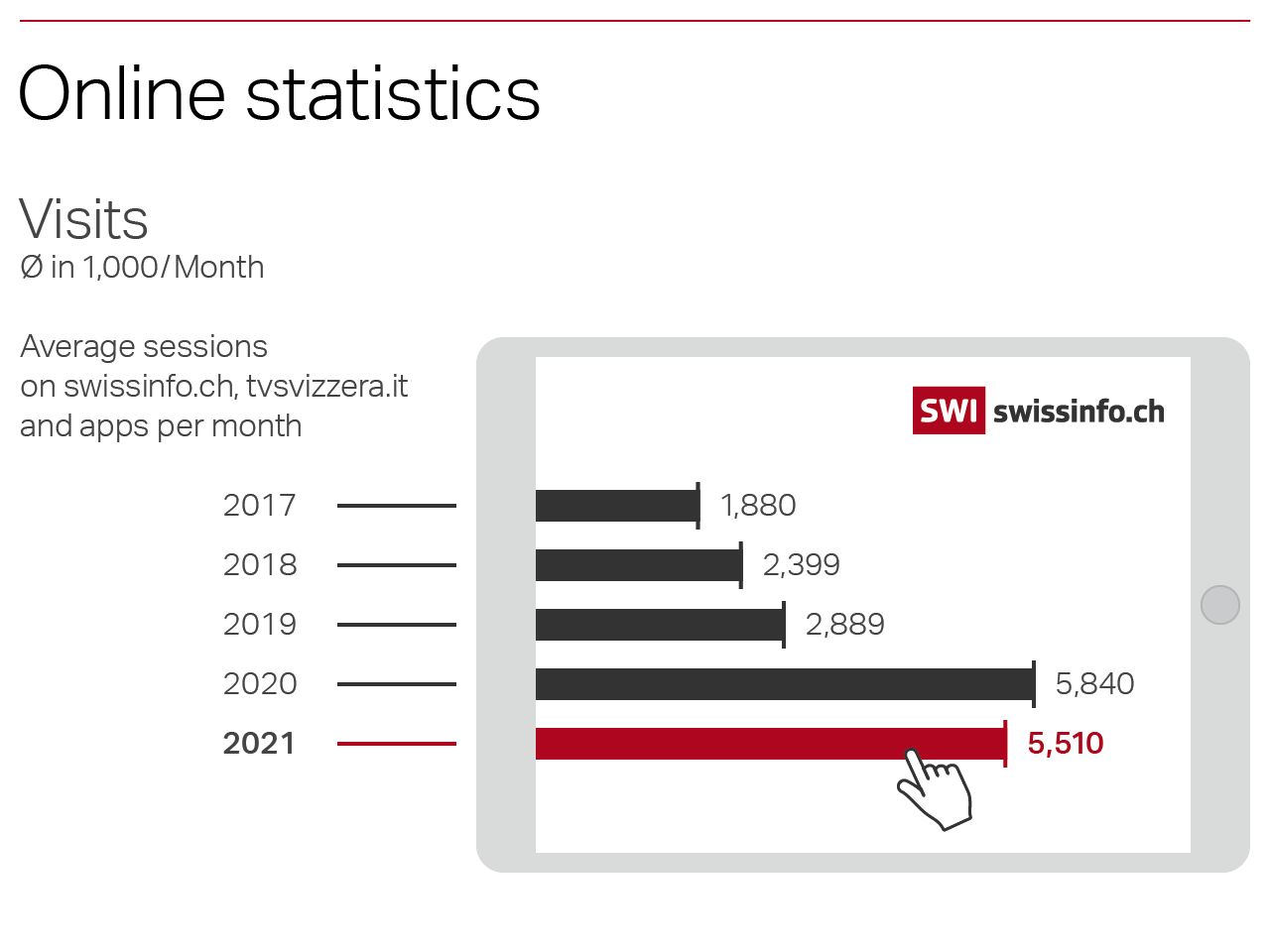

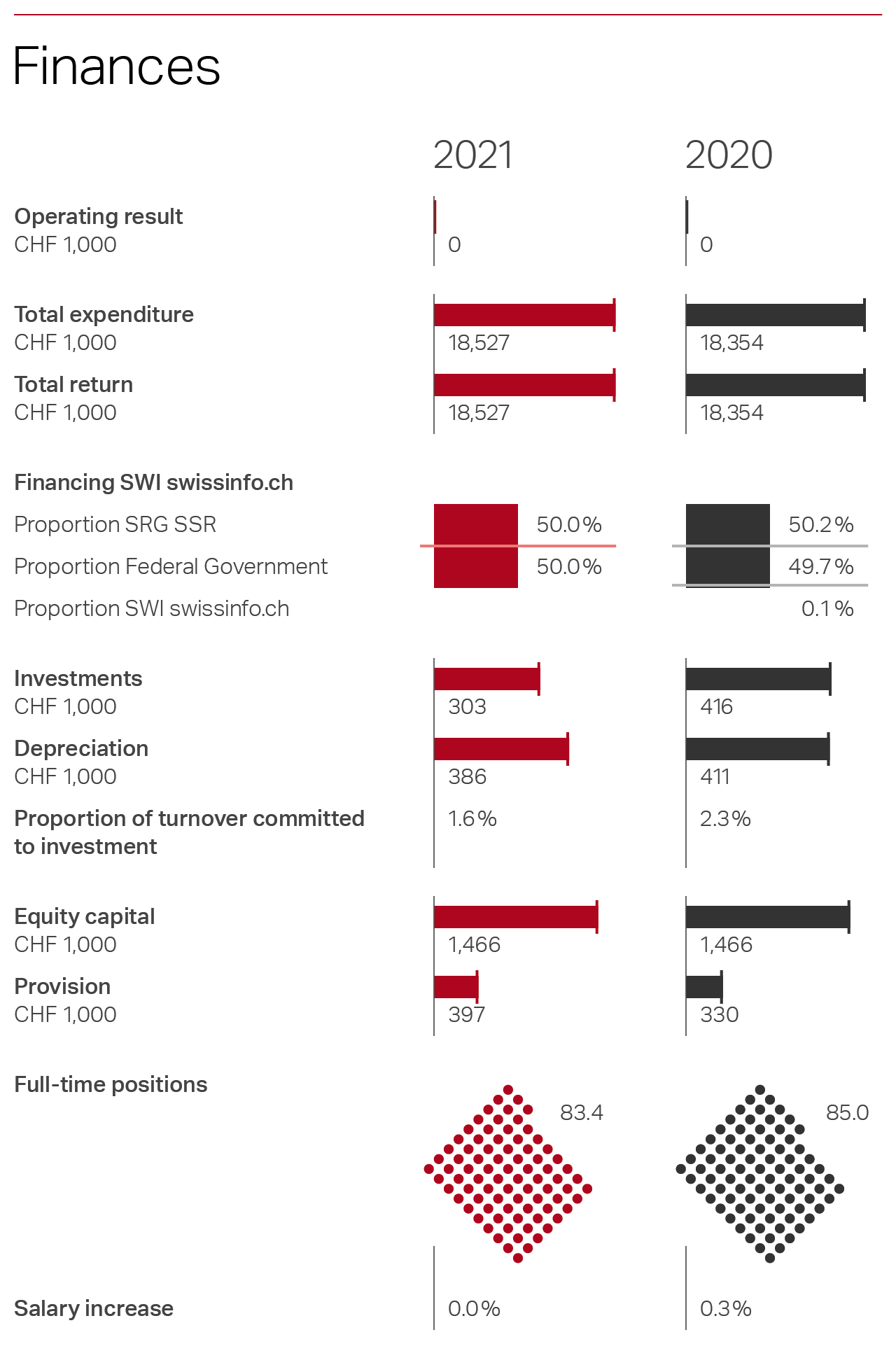

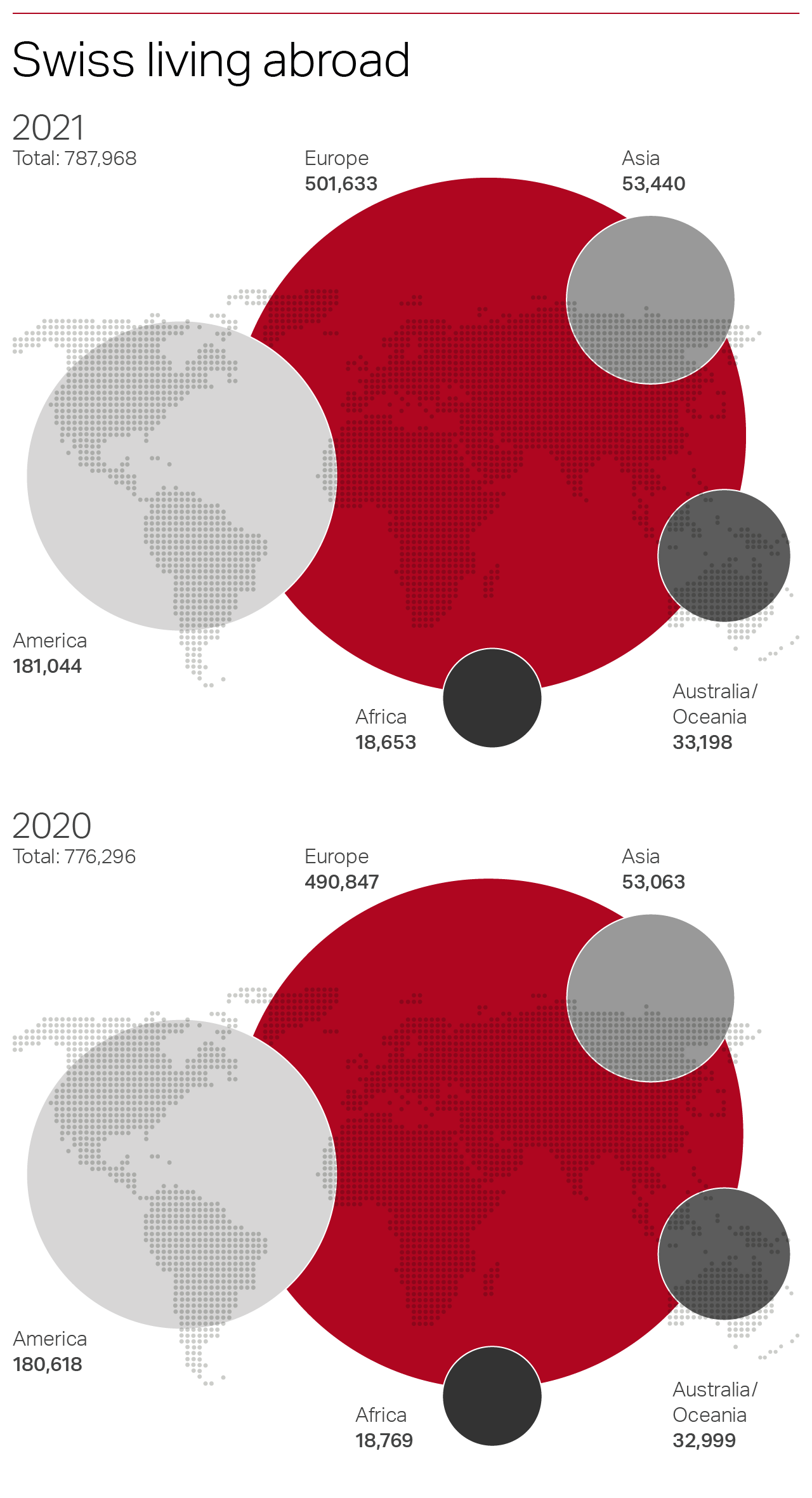

In compliance with the JTI standards
More: SWI swissinfo.ch certified by the Journalism Trust Initiative










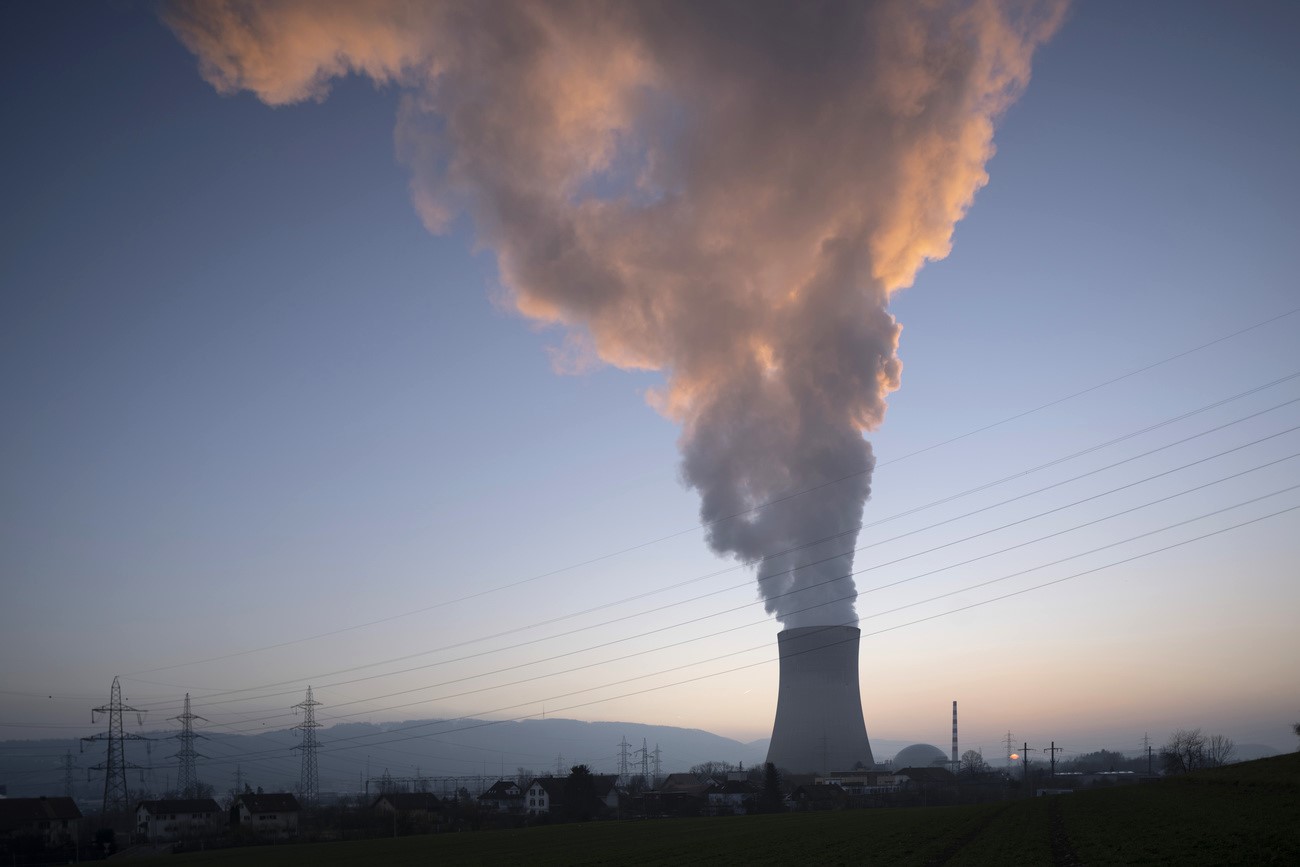


























You can find an overview of ongoing debates with our journalists here . Please join us!
If you want to start a conversation about a topic raised in this article or want to report factual errors, email us at english@swissinfo.ch.